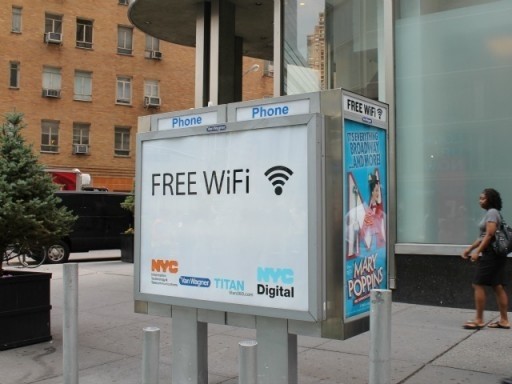A new pilot scheme looks set to find a use for New York's pre-cellphone era payphones, giving them a new lease of life as Wi-Fi access points as part of the city's goal of providing more digital inclusion for its residents. Initially the program will roll out creating ten free publicly accessible Wi-Fi hotspots in three of the city's boroughs (Manhattan, Brooklyn and Queens), with more planned if the trial is successful.
Those that wish to use them will be required to agree to the terms, and then visit the city's tourism site before they're up and running using the free service available to the general public. The service is currently advertisement free, but it's possible ads could be introduced in the future.

The new Wi-Fi points will be fitted with military grade antennas capable of providing wireless access at a distance of up to 300 feet away. They will be installed for free, despite it costing the payphone's owners, Van Wagner Communications, around $2,000 per kiosk. Eventually the new service could be rolled out across the city's 13,000 payphones with maintenance and ongoing costs paid by the payphone company.
New York already has plenty of Wi-Fi options, including AT&T's five year plan to install access points in many of the city's parks. That is in addition to the installation of free Wi-Fi access points in schools, libraries and senior centers, and countless other locations within the city.
In either case, Wi-Fi access will certainly ease mobile network congestion for wireless carriers in denser cities like New York by reducing some of the data traffic as consumers take advantage of wireless access instead.
It will benefit residents and foreign tourists alike, with the residents able to save precious megabytes on their download data caps as well as giving those visiting New York a free option for communicating with those back home without having to worry about facing huge bills when they return home from holiday.
Abandoned payphones have been a subject of contention for a while now, with an estimated 40-60% of NYC's payphones out of service. Residents complain that they "serve as magnets for criminal activity, including drug dealing, alcohol consumption, sexual activity, and public urination," and take up valuable side-walk space.
The full list of locations can be viewed here.